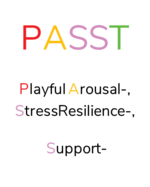PASST
PASST
PASST: Psychological support for child refugees from Ukraine: Playful Arousal-, StressResilience-, Support-Training

Principle investigators and team
Cooperation partners:
Prof. Dr. Eva Möhler & Andrea Dixius
Saarland University Hospital
Clinic for Child and Adolescent Psychiatry, Psychosomatics and Psychotherapy
Duration: 09/2023 - 08/2028
Background:
Children exposed to war and displacement are at increased risk for emotional dysregulation, contributing to mental health issues like anxiety, depression, and behavioural disorders. These experiences, including separation, loss, and instability, impair stress management. While clinical treatments exist for severe symptoms, interventions for children with subclinical distress are limited. PASST (Psychological support for child refugees from Ukraine: Playful Arousal-, StressResilience-, Support-Training) aims to address this gap with a playful programme to enhance emotional regulation and resilience, using evidence-based techniques tailored for displaced populations.
Project Description:
This project evaluates the effectiveness of PASST, based on the START-Kids manual, in improving emotional regulation and resilience in children aged 6-12 affected by war and displacement. It assesses the program's impact on emotional and behavioral issues, well-being, stress regulation, and includes gathering biological and immunological markers to explore the epigenetic effects of war and trauma.
The multi-centre study will use a pre-/post-/follow-up design with children affected by war and displacement, and a control group of peers without traumatic experiences. Study objectives include:
- Evaluate PASST Effectiveness and Feasibility:
Assess reductions in parent-reported emotional and behavioural problems, and self-reported distress, stress, well-being, and stress levels. - Identify Biological Markers of Emotional Regulation:
Investigate immunological and epigenetic changes, including DNA methylation and stress system activity, by collecting blood, hair, and buccal samples from both affected and control children.
Study registration
DRKS-ID: DRKS00032399
Funding
Else-Kröner-Fresenius Foundation
